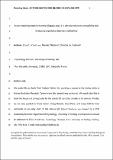Files in this item
Action-matching biases in monkeys (Sapajus spp.) in a stimulus-response compatibility task : evaluating experience-dependent malleability
Item metadata
| dc.contributor.author | O'Sullivan, Eoin Patrick | |
| dc.contributor.author | Caldwell, Christine | |
| dc.contributor.author | Claidière, Nicolas | |
| dc.date.accessioned | 2020-01-17T10:30:12Z | |
| dc.date.available | 2020-01-17T10:30:12Z | |
| dc.date.issued | 2017-11 | |
| dc.identifier | 265771131 | |
| dc.identifier | 008cfd9a-996b-4285-9ffe-8b584980b0af | |
| dc.identifier | 85028448651 | |
| dc.identifier.citation | O'Sullivan , E P , Caldwell , C & Claidière , N 2017 , ' Action-matching biases in monkeys ( Sapajus spp. ) in a stimulus-response compatibility task : evaluating experience-dependent malleability ' , Journal of Comparative Psychology , vol. 131 , no. 4 , pp. 337-347 . https://doi.org/10.1037/com0000081 | en |
| dc.identifier.issn | 0735-7036 | |
| dc.identifier.other | ORCID: /0000-0001-9380-1648/work/67526167 | |
| dc.identifier.uri | https://hdl.handle.net/10023/19301 | |
| dc.description | Eóin P. O’Sullivan was funded by a PhD studentship from the Department of Psychology, University of Stirling. | en |
| dc.description.abstract | Stimulus-response compatibility effects occur when observing certain stimuli facilitate the performance of a related response and interfere with performing an incompatible or different response. Using stimulus-response action pairings, this phenomenon has been used to study imitation effects in humans, and here we use a similar procedure to examine imitative biases in non-human primates. Eight capuchin monkeys (Sapajus spp.) were trained to perform hand and mouth actions in a stimulus-response compatibility task. Monkeys rewarded for performing a compatible action (i.e., using their hand or mouth to perform an action after observing an experimenter use the same effector) performed significantly better than those rewarded for incompatible actions (i.e., performing an action after observing an experimenter use the other effector), suggesting an initial bias for imitative action over an incompatible S-R pairing. After a predetermined number of trials, reward contingencies were reversed; i.e., monkeys initially rewarded for compatible responses were now rewarded for incompatible responses, and vice versa. In this second training stage no difference in performance was identified between monkeys rewarded for compatible or incompatible actions, suggesting any imitative biases were now absent. In a second experiment, two monkeys learned both compatible and incompatible reward contingencies in a series of learning reversals. Overall, no difference in performance ability could be attributed to the type of rule (compatible/incompatible) being rewarded. Together, these results suggest that monkeys exhibit a weak bias towards action copying, which (in line with findings from humans) can largely be eliminated through counter-imitative experience. | |
| dc.format.extent | 519560 | |
| dc.language.iso | eng | |
| dc.relation.ispartof | Journal of Comparative Psychology | en |
| dc.subject | Stimulus-response compatibility | en |
| dc.subject | Imitation | en |
| dc.subject | Social learning | en |
| dc.subject | Capuchin monkeys | en |
| dc.subject | BF Psychology | en |
| dc.subject | NDAS | en |
| dc.subject.lcc | BF | en |
| dc.title | Action-matching biases in monkeys (Sapajus spp.) in a stimulus-response compatibility task : evaluating experience-dependent malleability | en |
| dc.type | Journal article | en |
| dc.contributor.institution | University of St Andrews. School of Psychology and Neuroscience | en |
| dc.identifier.doi | 10.1037/com0000081 | |
| dc.description.status | Peer reviewed | en |
| dc.date.embargoedUntil | 2017-11-30 | |
| dc.identifier.url | http://hdl.handle.net/1893/25491 | en |
This item appears in the following Collection(s)
Items in the St Andrews Research Repository are protected by copyright, with all rights reserved, unless otherwise indicated.

